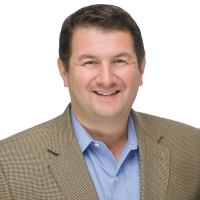Joe Kochan is taking the job as executive director of the National Spectrum Consortium (NSC) at a time when building bridges between spectrum stakeholders is of utmost concern – and the Department of Defense (DoD) in a lot of ways is in the middle of it all.
The NSC announced Kochan’s appointment on Tuesday.

“On behalf of the entire NSC Executive Committee, let me say how excited we are to work with Joe,” said NSC Chair Salvador D’Itri, VP/federal at Federated Wireless, in a statement. “I’m confident he will help us accelerate the development of next-generation technologies support critical federal missions and ensure U.S. competitiveness.”
The NSC works with the government to provide access to more than 400 members of U.S. industry and academia who work with all kinds of systems, sub-systems and components related to spectrum or the information that rides on it.
A telecom veteran who worked as a program officer for the National Telecommunications and Information Administration (NTIA), Kochan most recently served as co-founder and CEO of US Ignite, a startup public/private partnership collaborating with smart cities and research testbeds.
Before that, he was a founder of DigitalBridge Communications, a Virginia-based startup (not to be confused with Florida-based DigitalBridge Group, which is a different company). Kochan’s company focused on providing broadband services in Midwest and Mountain West states using WiMAX back in the 2005 to 2010 or 2011 timeframe.
The open Radio Access Network (RAN) movement and spectrum sharing are two topics that are top of mind these days in the nation’s spectrum halls. Kochan’s job will be to closely work with NSC’s executive committee to drive the organization’s strategic vision while engaging with government leaders, industry partners and overseeing daily operations of the consortium.
In 2020, the DoD awarded the Spectrum Forward Other Transaction Agreement (OTA) to the NSC to accelerate the development, adoption and deployment of next-generation technologies. The OTA has a term of five years and a maximum value of $2.5 billion.
The opportunity for the federal government, DoD and potentially other federal agencies to use and benefit from open RAN and more flexible radio solutions is tremendous, Kochan told Fierce.
The DoD understands that, and more broadly, there’s likely to be a greater effort from outside the federal government, maybe this year, to fund more open RAN research and development, and NSC could potentially play a role there, he said.
As for spectrum sharing, that’s clearly a way for the DoD and the federal government to make more spectrum available and build more flexible radio systems. Research and prototyping efforts continue, and NSC is a part of all that.
“You also have sharing issues beyond just the traditional ones with DoD,” he said, noting there are sensing issues with radar, satellite and terrestrial communications. “I think there’s a ton of work that has to be done” to get the technologies that will make it possible to a place where they’re more robust and everybody trusts in them.
Citizens Broadband Radio Service (CBRS) is an excellent example of one of the widest forms of spectrum sharing that exists now between federal and non-federal users. Now that it’s been shown that the commercial market works for CBRS, it’s time to look at ways to expand the model, he said.
“I am hoping to build on the success that the NSC has had” and to further develop the public-private partnerships in some of these critical areas, he said. “These problems have to get solved and the federal government has to figure out how to share spectrum, how to get more nimble, how to fund the open RAN research that we all know is going to be important. I’m just excited to be a part of it.”
The NSC was founded by Vanu Bose, an electrical engineer who invented the first FCC-certified software defined radio. His company, Vanu, gets credit for many other wireless breakthroughs. Vanu was the son of Amar Bose, whose name is behind the famous speaker technology. Vanu Bose died suddenly in 2017 at the age of 52.
Last year, the NSC distributed the first-ever Dr. Vanu Bose Best Paper Awards to scholars from Virginia Tech, George Mason University and Johns Hopkins University.